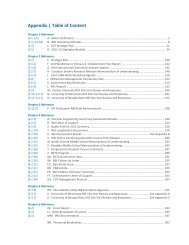Fries
Fries
Fries
Create successful ePaper yourself
Turn your PDF publications into a flip-book with our unique Google optimized e-Paper software.
ICAME Journal No. 34sion and were following a line of logic would tend to use falling intonation,while if they were mystified and had no real idea as to the profession they mightuse rising intonation.Related to the fact that <strong>Fries</strong> had no theory of register is his constant focuson obtaining samples of spoken language (or at least as close to spoken languageas he could manage at the time). The quotations in Section 2.4 adequately documenthis attitude that the spoken language is primary and that written languageis a reflection of the spoken language. These days we have a more complicatedapproach to language variation. With the development of the theoretical conceptsof register (e.g. Gregory 1967; Halliday 1985, 2007) and the quantitativeanalyses of people such as Douglas Biber (1988) we have statistical evidencethat demonstrates that a variety of factors affect the nature of the language usedin a particular social interaction. The difference between spoken and written languageis but one of these factors.3.2 The importance of paradigmatic oppositions<strong>Fries</strong>’s emphasis on investigating paradigmatic oppositions is in my view welltaken. When we count the instances of only a portion of the potential we reducethe value of our counts. If, for example, a theory divides clauses into two grammaticalfunctions: Theme and Rheme, it is not enough merely to study the lexis,or structures or meanings that are found within one of those functions but not theother. If we discover that certain features, say, characterize the Themes, we stillcannot say if those features are distinctive within the texts considered. That is,we do not know if we have found those characteristics in the Themes becausethe entire text contains those characteristics in great abundance, or whether theThemes contain a greater than normal concentration of those characteristics. In<strong>Fries</strong>’s view, even though we may be primarily interested in only one of theterms in a system, we need to examine all the terms within that system in orderto ground a full interpretation of the results.3.3 The need for a combination of quantitative analysis and qualitativeanalysisMuch of <strong>Fries</strong>’s work was done at a time when most linguists – particularly inthe U.S. – saw no relevance of quantitative analyses for linguistic description.Chomsky (1962: 128, n9) continued this earlier tradition in part when in the processof discussing the concept of grammaticality he said:It seems clear that probabilistic considerations have nothing to do withgrammar, e.g., surely it is not a matter of concern for the grammar of108








